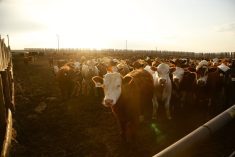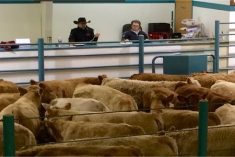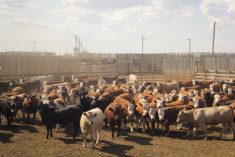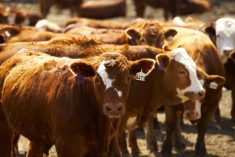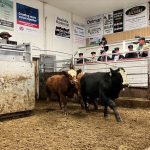Western Canadian feeder cattle prices were steady to $3 higher on average this past week; quality calves were as much as $5 higher in certain cases. Strength in the fed cattle market enhanced feedlot margins for nearby positions which set a positive tone.
South of the border, feeder prices were $3 to $5 higher in comparison to seven days earlier, which also lent support to Canadian prices. It appears flesh conditions have improved since earlier in fall due to the colder temperatures. Higher-quality steer calves averaging 500 to 525 pounds were readily trading in the range of $300 to $305 landed in the Lethbridge area. Premiums were paid on feature cattle as healthy Charolais-based steers weighing just under 700 lbs. with light flesh were quoted at $250 landed in southern Alberta. However, the volatility continues at the higher levels, with prices varying by as much as $10 throughout the week for similar-weight feeders. Price spreads between weight categories are extremely wide and the market is adjusting for weight gain efficiencies longer-term.
Read Also

U.S. grains: Soybeans turn higher as traders weigh China demand; wheat climbs
Chicago | Reuters – Chicago soybean futures turned higher on Wednesday on technical buying and continued hopes of stronger Chinese…
Alberta packers were buying fed cattle from $174 to $176, about $14 above break-even on past summer placements. Looking forward, break-even values for pen closeouts during the March/April time frame are in the range of $176 to $180. We now find feeder cattle prices are pushing feedlot margins into red ink for the spring period, which is a red flag.
Barley prices were trading at $192 per tonne delivered Lethbridge this past week, but the market is poised to move up to the range of $200 to $210 due to the tighter fundamental structure. Feedlot break-even prices are going to edge higher so operators may start backing away at the higher levels.
Wholesale boxed beef prices have stabilized at the higher levels and further upside will be needed to justify stronger fed cattle prices. The beef complex is moving into a higher consumptive period for December, followed by food spending contraction during January and February. Despite the year-over-year decline in first-quarter beef production, there are some risks to the demand equation.
Conclusion: feedlot brea- evens for spring are above current market values and fed cattle prices look vulnerable early in 2015. This is the first signal that the upward trend for feeder cattle may be within grasping distance of the final stages.
— Jerry Klassen is a commodity market analyst in Winnipeg and maintains an interest in the family feedlot in southern Alberta. He writes an in-depth biweekly commentary, Canadian Feedlot and Cattle Market Analysis, for feedlot operators in Canada. He can be reached by email at [email protected] for questions or comments.



